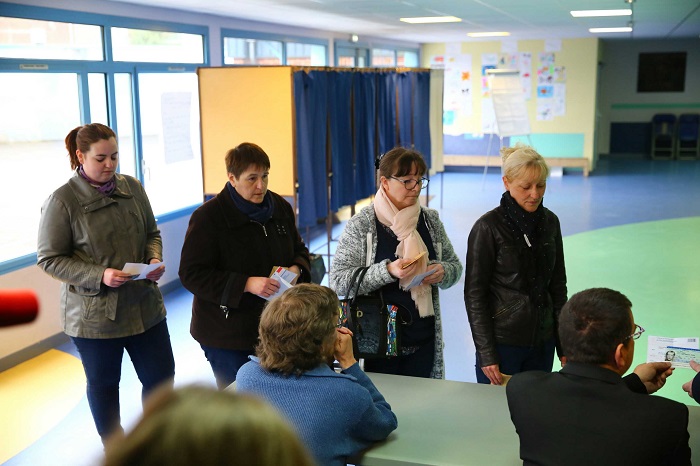French vote in watershed election for country, Europe
Published : 07 May 2017, 18:52
Updated : 07 May 2017, 18:56
Polling stations opened on France's European mainland on Sunday for the decisive round of a presidential election crucial for both the country and the European Union (EU).
Nearly 47 million voters are expected to cast their ballots, choosing between pro-Europe, pro-business centrist candidate Emmanuel Macron, and anti-immigration, anti-EU far-right leader Marine Le Pen.
The two contenders proposed very different prospects for France throughout an intense campaign.
Dubbed himself as "the candidate for jobs," Macon invited electorate from various political views to endorse his pro-business projects and plans to revive the European project.
His rival Le Pen, proposing a strict opposite program based on protectionist approaches, promised voters a return to the national currency and tightening internal borders to restore security.
At a polling station in an elementary school in Paris northern suburbs, white voting papers with the name of the two finalists, were stacked on the tables, ready for people to take into the voting booth.
The volunteering staff were welcoming voters under the watch of gendarmes deployed to ensure a smooth voting in a context of high security risk.
Wahiba, a nursery assistant of Algerian origin, is a Greens faithful but switched to the centrist candidate given the absence of the ecologists in the presidency race.
"I think Macron is the less worst among all the candidates. Le Pen's proposals make me worried about the future of our children. I choose Macron," she told Xinhua.
To Telly, a supporter of far-left candidate Jean-Luc Melenchon, who was defeated in first round, "the enemy of my enemy is my friend."
"I voted for Macron. He showed that he can govern by gathering all the French regardless their cultural, origin and religion differences," the young woman said.
Stephane, a taxi driver, said he voted for the anti-establishment candidate Le Pen in a "punishment vote" over "failed policies of mainstream parties" that dominated the French political landscape for decades.
"The right or the left are the two faces of the same coin. They pledged a lot but did little for people. And even Macron is following their path. So, I'm supporting Le Pen who is proposing something different," he said.
A retired voter who refused to be named shared the same view.
"Why we don't let the far-right test its policy on the ground? Maybe it can succeed in what the so-called major parties failed to do," he said.
More than 66,000 polling stations on the French European mainland opened for Sunday's runoff vote at 08:00 local time (0600 GMT) and are scheduled to close at 20:00 in big cities, while the rest will close at 19:00.
French voters in overseas territories casted their votes on Saturday, but the results will be only known after all votes are casted on the mainland.
Preliminary projections of the voting results are expected to be revealed by various sources after 20:00. The law bans the publication of any early poll or counting results of the vote before all polling stations are closed.
In the April 23 first round vote, former economy minister Macron led the 11-candidates list with 24.01 percent of votes, outpacing his rival far-rightist Le Pen, whose score stood at 21.30 percent.
Several major French opinion polls conducted after the first round vote have been consistent, estimating that former economy minister Macron is likely to win the runoff after an intense campaign against Le Pen.
The two candidates both casted their votes on Sunday morning. Macron, accompanied by his wife Brigitte, casted his vote around 11:00 local time in Le Touquet, north France. Le Pen voted in Henin-Beaumont, north France, around 11:05.
Outgoing French president Francois Hollande and prime minister Bernard Cazenveuve both voted around 10:25 (0825GMT). Hollande publicly endorsed Macron, who had served in his government as economy minister, calling on voters to support Macron and to reject the rise of the far-right.
Voter turnout at 12:00 (1000 GMT) Sunday in the runoff election was 28.23 percent, lower than the 30.66 percent at the same hour for the second round presidential election in 2012, according to French interior ministry.
The French interior ministry has vowed to to carry out tight security measure to safeguard the election, with over 50,000 police and gendarmes deployed across the country.
On Sunday afternoon, the courtyard outside the Louvre Museum, where Macron plans to celebrate if he wins the election, was temporary evacuated for "precautionary measures," the Paris police department said.
After a campaign overshadowed by a series of twists, the 2017 French election is one of the most unpredictable in the country's modern history, as growing public disenchantment forced many voters to turn their backs on the mainstream parties or even refuse to make a choice.
Who will win the presidency and lead France in the next five years? The mystery will be resolved on Sunday evening after the closure of all polling stations across France. But in the meantime, a new question will emerge -- whether the new president can keep the promises and lead France out of the current economic gloom and social strains?


